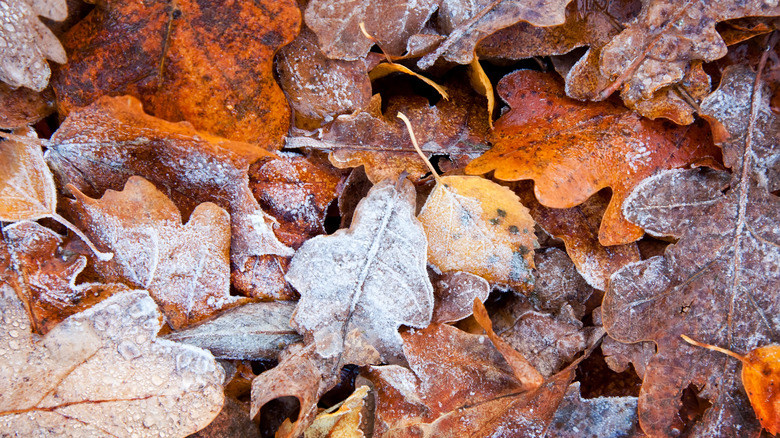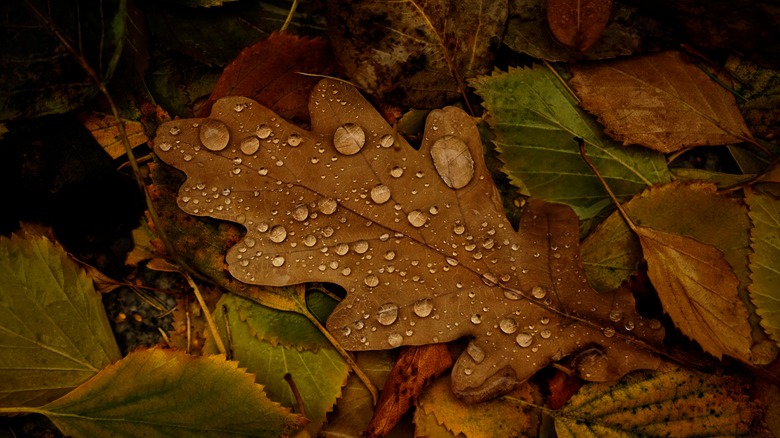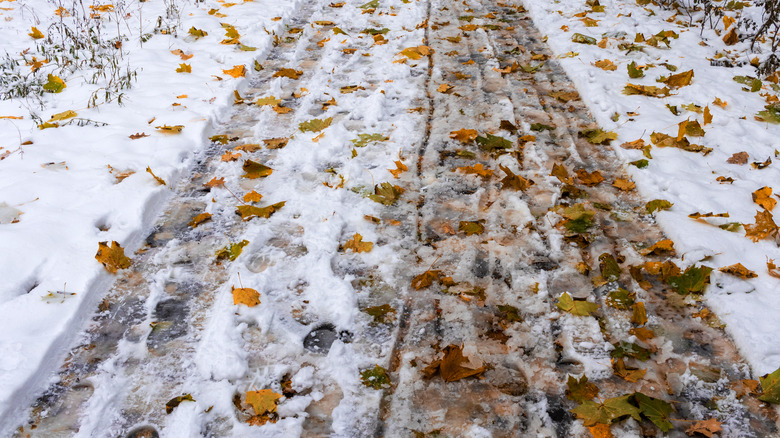What Happens To Your Lawn When Fallen Leaves Are Covered By Snow
Autumn's beautiful colors are an annual event many people look forward to; some even travel long distances to see the spectacle. But all that colorful tree foliage eventually becomes piles of leaves on the lawn, so raking and bagging leaves is a yearly ritual most homeowners need to deal with if they have mature trees on or near their property. But is it really necessary to remove the leaves from your lawn? There are differing opinions on this, but there seems to be some agreement that leaving thick layers of leaves (more than an inch deep) over the winter may not be the best thing for your lawn. If snow packs the leaves down on your lawn, this may cause issues after the spring thaw, including possibly killing your grass.
Leaving some leaves unraked can be good for the ecosystem of your lawn, which may be home to butterfly larvae and other insects in early spring. Decaying leaves also provide nutrients for the soil. The key is knowing how much leaf removal to do: no leaves means no composting of valuable plant nutrients and no habitat for pollinating insects, but too many leaves may affect spring grass growth, especially if weighed down by snow.
Luckily, it's possible to approach leaf removal in a way that balances maintaining a healthy lawn and preventing possible damage. Part of achieving this balance is knowing what kinds of leaves are okay to leave alone (no pun intended) and which ones should be removed.
Which leaves to leave
Leaves come in different sizes, shapes, and thicknesses and fall at different times depending on the variety of tree. Maple leaves fall over a period of several weeks, and once temperatures dip below freezing consistently, maple leaves will drop to the ground soon after. Maple leaves also dry out and break down into compostable material relatively quickly. They also respond well to being mowed over, which shreds them into a size that decays more quickly. These can be left in a light layer (less than an inch deep) on your lawn to help nourish the soil. This also applies to beech, ash, and many other deciduous trees.
Oak leaves, on the other hand, may remain on tree branches well into the winter season, and when they do fall, they can cause problems. Some varieties of oak have very thick, strong leaves that do not break down easily because they contain tannins, which slow down decomposition. Removing most of your oak leaves is recommended, but wait until late autumn so that wildlife has a chance to get some acorns (a valuable food source). However, oak leaves are useful for mulch on flower beds or around shrubs and may be raked off in early spring before spring-blooming bulbs emerge.
Left unraked or unshredded on the lawn, large or thick leaves flattened by snow can definitely affect your lawn by blocking light and air. Deciduous trees with large leaves include oak, catalpa, London plane, bigleaf magnolia, and sycamore.
How snow impacts leaves over the winter
If you live in an area with heavy snowfall, removal of leaves from certain areas is important before winter arrives. Any area that serves as a walkway, like sidewalks, garden paths, or driveways, should be free of leaves. Frozen moisture on leaves can cause slippery surfaces. Also, once frozen leaves form a solid chunk of ice, it takes several days of warm temperatures to break them down, so it's best not to leave large amounts of them intact.
If you want to leave some shredded or lightweight fallen leaves on your lawn to help nourish the soil, it can be a good way to help preserve your yard's natural ecology. When using leaves as mulch on flower beds, these layers can be up to 2 inches deep. As with other garden tasks, observe what works and what doesn't in your space. If you find that using leaves for mulch helps save time and money and also nourishes your flower beds, keep doing it. If you notice that leaving a light layer of shredded leaves impacts spring grass growth negatively, take note and be sure to rake and remove all leaves the following season.


